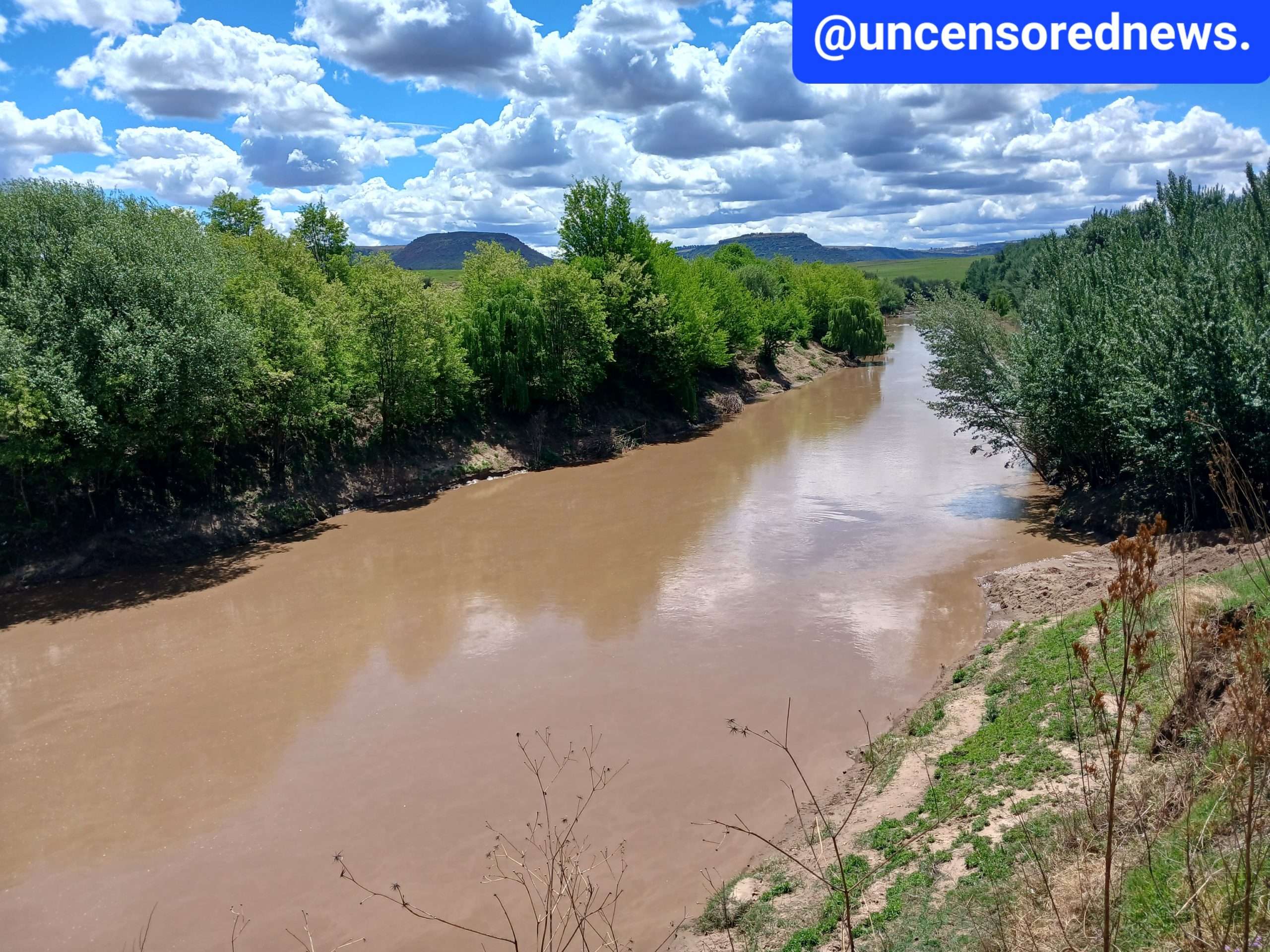

The Hidden Environment Toll of Sand Mining on Mohokare
“After water, sand is the most consumed natural resource in the world. It has come to a point where sand is called ‘the new gold,’ and the indiscriminate extraction of this new gold is destroying physical and biological environments all over the world.”

Mohokare, glistening under the midday sun, was only half full two days after the refreshing rainfall, its tranquil waters now gently meandering through the verdant landscape.
No one dares to cross the mighty Mohokare in this state. Even those who traverse it daily in search of its prized clean sand find it unwelcoming.
Mohokare is a tributary of the Orange-Senqu River Basin, covering nearly one million square kilometers and traversing four Southern African countries: Lesotho, South Africa, Botswana, and Namibia.
Tšokolo Ramafikeng, a 28-year-old among the dozens of people who mine sand in the Mohokare River, sells both coarse and fine sand for construction purposes.
A 2022 study highlights the negative environmental impacts of sand extraction from riverbeds and banks globally. “The effects on the chemical environment are reduced water, air, and soil quality through pollution,” read the study.
In Lesotho, Nthati Toae, a Hydrobiologist from the Department of Water Affairs, warns that sand mining is depleting rivers across the country. “While sand mining is essential for the country’s construction sector and river sand is favoured for its cleanliness, it is wreaking havoc on our rivers,” Toae told Uncensored News on October 10, 2023.
Follow the River
Ramafikeng stretches his right leg on the truck’s bonnet as he patiently waits for customers, one by one, at Sea-Point area in the capital Maseru.
Moments later, a group of men in a silver VW Polo asks for a relatively small load that costs M400 but leaves empty-handed because Ramafikeng does not deliver small quantities. A six-cubic load of sand costs between M1000 and M1400, and the price covers transportation.
The second customer seeks inquiries and takes Ramafikeng’s contact details for future use.
“Today, we are not going down the river to mine sand due to the high water levels,” Ramafikeng says during the interview while attending to his customers.
He describes sand mining as a physically demanding job, requiring early starts from 4 am to gather enough sand to sell to his customers.
“Sand mining is seasonal. We cannot go down in the river when it is raining, and it is even worse with Mohokare. Since it rained two days ago, I give this river at least two weeks for the water levels to go down and allow us to mine,” Ramafikeng said.

Ramafikeng says it takes at least two weeks to mine sand after rainfall.
Because of dynamics characterised by weather conditions and high or low demand for sand, Ramafikeng does not really have his day cut out for him. “There are times when sand is on high demand, and I wake up as early as 4 am to mine and deliver during the day,” he said.
Section 46 of the Lesotho Mines and Minerals Act 2005 says a person who wishes to conduct small-scale mining operations, like Ramafikeng, may apply for a mineral permit to conduct such operations for any mineral other than diamonds over an area not exceeding 100m².
On 20 October, Department of Mining public relations officer ‘Makananelo Motseko told Uncensored News that a mineral permit, renewable after every year, costs M100.
“Furthermore, we issue mining leases that have a duration of 10 years, but a mining lease is free,” Motseko said, adding that two mining leases for sand mining were currently in place.
An Irish-based University of College Cork awarded Toae with an MSc in Freshwater Quality Monitoring few years ago. As part of her master’s studies, Toae was determined to find an answer to this question – why Lesotho rivers are depleting?
For Toae, it was crystal clear that Lesotho rivers were unhealthy because banks were eroding, and their overall health was just deteriorating.
“Due to our country’s topography, I initially suspected issues like overgrazing and soil erosion were responsible for the deterioration of our river health,” Toae told Uncensored News on 10 October.
WATCH:
She says her data analysis revealed a totally different story, indicating that the problem originated within the river itself. Her findings point a finger at sand mining.
According to Toae, a river is designed to maintain a delicate balance between the sediment it receives and discharges, and as such, disturbing this equilibrium, as sand mining does, forces the river to erode its banks to fill the voids created by the mining.
She argues that the impacts of sand mining on Lesotho rivers should be of concern. “The health of a river largely depends on the condition of its banks, as intact, vegetation-covered banks enhance water infiltration during rainy seasons. They also help filter water, leaving it cleaner as it enters the river.”
“People may be surprised to see that the more sand is mined, the more sand ends up in the river, and this is primarily because rivers like Mohokare have a high content of sandstone in their geology. However, this constant influx of sand weakens the river banks, resulting in a loss of water quality and quantity, as perennial rivers like the Mohokare are recharged by groundwater,” Toae said.
Rotational mining
Excessive sand mining causes extensive degradation in the river. And, as such, Toae proposes that Lesotho must adopt an arrangement similar to rotational grazing – a system that involves the movement of animals from one grazing area to another on a scheduled basis to help maintain rangelands’ health while providing valuable ecosystem services.
“This would allow the river to recover before miners return and start mining all over again for a specified time,” she said.
On days and weeks that Mohokare is inaccessible due to high water levels, Ramafikeng and other miners look for this precious commodity in smaller rivers. He occasionally extracts sand from Thaba-Bosiu in Maseru and a Mafeteng river called Tsoaing.
“Mining from Thaba-Bosiu and Tsoaing is expensive because the longer the distance, the higher the costs of diesel. This means we will have to sell a load at an increased price, and customers complain,” Ramafikeng said.
Additionally, miners construct gravel roads to access the river at their own costs, and rotational mining would attract further expenses. Ramafikeng is not the only one mining at Mohokare; tens and tens of people are and they are not practising rotational extraction.

Department of Water Affairs Hydrobiologist, Nthati Toae. Credit: Pascalinah Kabi.
Toae says evidence points out that excessive sand mining depletes riverbeds and banks, critical filters that ensure that only clean water enters the river.
“We must educate sand miners on the environmental consequences of their actions,” Toae said, adding, “our rivers are in dire straits, and it is heartbreaking to witness their degradation.”
While Motseko says the Department of Mining monitors sand miners “through inspections,” there is little to no evidence that miners are encouraged to practice rotational mining to allow rivers to recover.
According to authors of The environmental impacts of river sand mining, after water, sand is the second most consumed natural resource in the world. “It has come to a point where sand is called ‘the new gold,’ and the indiscriminate extraction of this new gold is destroying physical and biological environments all over the world.”
Sand, they say, is a provisioning ecosystem service often extracted from aquatic environments such as rivers and coasts. “This is because water is an important means of transportation for sediment.” If Lesotho is not careful, warns Toae, depleting rivers like Mohokare because of sand mining could eventually lead to a loss of underground water.
“Lesotho is known for its abundant water but at the end of the day, we will end up not having that very same water because of our own careless actions,” Toae said.
She believes that if miners are sensitised enough on the dangers of their actions, Lesotho can dodge a bullet and successfully rehabilitate Mohokare and other rivers in the country.
Citizens Science Initiative
Mohokare is not foreign to abuse. Earlier this year, MNN Centre for Investigative Journalism exclusively reported there were high levels of chemical pollution in Mohokare river.
And on 18 October 2023, the European Delegation to Lesotho, ReNOKA and Orange-Senqu River Commission (ORASECOM) said Mohokare was further polluted with plastic.
“The Mohokare River is a tributary of the mighty Orange-Senqu River but sadly, like many rivers across the world, it has become polluted with plastic and other waste,” read a joint statement issued by European Delegation to Lesotho, ReNOKA, and Orange-Senqu River Commission (ORASECOM).
ORASECOM has conducted three Joint Basin Surveys (JBS) and found that pollution and soil erosion have had an inordinate impact on the health of Lesotho’s river systems and the quality of the water.
“The third JBS, conducted in October 2021 assessed the trends in water resources quality over the last 10 years, and some of the causes behind these changes. The findings showed that overall, the water resource quality of the Orange-Senqu River System appears to have declined since JBS-1.
“As a result, from the concerns found by the JBS, ORASECOM is educating and training the school students to track the river health through the Citizen Science Initiative, which uses the MiniSASS tool. In Lesotho, ORASECOM is partnering with the Department of Water Affairs to carry out the Citizen Science initiative,” read the statement.
MiniSASS is a simple tool that can be used by anyone to monitor the health of a river by collecting a sample of macroinvertebrates (small animals) from the water.
In Lesotho, the Citizen Science Initiative includes uniting and training volunteers and 200 students from four schools in Maseru and Berea on the use of MiniSASS. They are expected to use this tool to monitor Mohokare on a monthly basis.
Meanwhile, Motseko says a collaboration between departments of mining, environment, and water affairs to mitigate the impacts of sand mining on river health is in place.
On her part, Toae says Lesotho must establish buffer zones between farm-fields and rivers to create a balance between nature and human activity.
Tags: